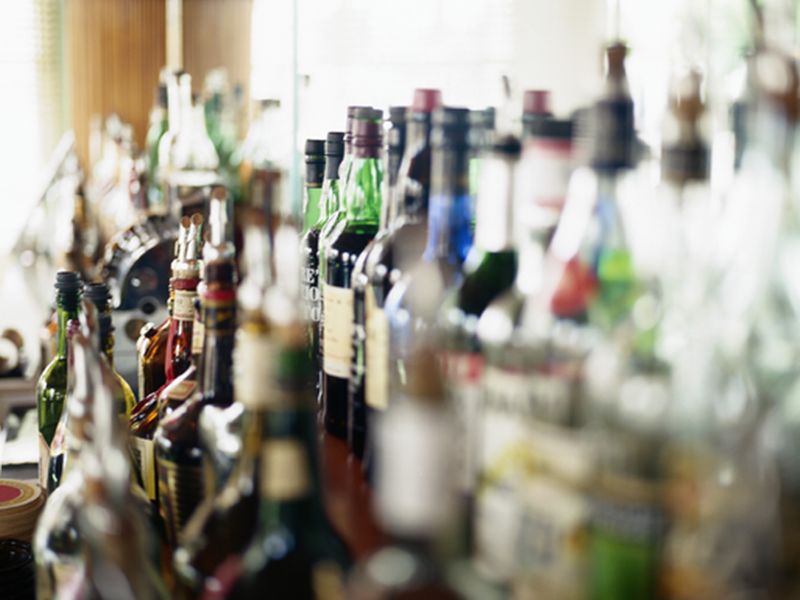
Mixing caffeine-loaded energy drinks and booze could be a recipe for trouble. That’s the word from a new study that says the popular party duo ups the odds someone will get hurt.
Researchers in Canada analyzed results of 13 prior studies. Most reported a higher rate of injuries when alcohol was paired with an energy drink like Red Bull or Monster Energy compared to drinking alcohol alone, they said.
“Current research generally supports a relationship between consuming alcohol mixed with energy drinks and an increased risk of injury,” said study lead author Audra Roemer, a graduate student with the University of Victoria in British Columbia.
Besides falls, car accidents and such, the researchers looked at suicidal behavior and violence. Based on the study results, Roemer said injury risk — intentional or accidental — could be several times higher for the combination drinker.
“The stimulant effects of the caffeine in energy drinks can work to mask the sedative effects of alcohol, although energy drinks don’t lessen the impairing effects of alcohol on the body and brain,” Roemer said.
“This could result in people underestimating their level of intoxication,” she added.
Blending alcohol and highly caffeinated drinks became popular about 10 years ago, said Cecile Marczinski, who studies alcohol use. She is a professor of psychology at Northern Kentucky University.
“It’s a young person’s drink,” said Marczinski, who wasn’t involved in the study. It’s often available in bars and restaurants as a mix of, say, vodka and Red Bull or Monster Energy, she added.
“They’re considered party drinks. You typically don’t have someone sitting at home mixing energy drinks with alcohol,” she said.
Prepackaged caffeinated alcohol drinks are essentially banned in the United States and Canada. But you can buy the components separately “and mix them yourselves in a glass,” Marczinski said.
The results aren’t always pretty. Emergency department
visits involving energy drinks nearly doubled between
2007 and 2011, with roughly 15 percent of these visits related
to combination alcohol-energy drink use, the study authors said in background notes.
Roemer said an estimated 25 percent of college students in Canada consume the combination drinks. Devotees say they like the taste and appreciate the boost they get from the high levels of caffeine in the energy drinks, she said.
They also like being able to stay awake longer to party more, Roemer said. Some feel like they can drink more without feeling drunk, she added.
However, Marczinski said her team has found that while people may feel more alert when they combine alcohol and caffeine, their perception doesn’t match up with reality.
The makers of Red Bull say an 8-ounce can contains about 80 milligrams of caffeine, which is similar to that in a cup of coffee.
All but five of the 13 studies reviewed by Roemer and her co-author, University of Victoria professor Tim Stockwell, were from the United States. All examined links between caffeinated alcoholic drinks and injuries, unsafe driving/motor vehicle accidents or suicidal thoughts.
The studies used a variety of methods to examine the issue and looked at various groups of people, such as U.S. and Canadian college students, U.S. high school seniors and manual workers in Taiwan.
Ten of the studies linked a higher rate of injuries to drinking the alcohol/energy drink duo versus drinking alcohol alone. But, it’s not clear how often these injuries occur. And, the studies don’t actually prove that the combination beverages are responsible for the mishaps. Other factors could cause the extra risk.
Among the three studies that detected no link between the two, an Australian paper found that those who stuck to alcohol alone were more likely to be injured than those who added energy drinks to their booze.
There were also hints among the studies that the combo drinkers are more likely to take risks and seek sensation, one possible explanation for an increased risk of injury.
To avoid the potential dangers, Marczinski suggests that people not drink alcohol and energy drinks at the same time.
The study appears in the March issue of the Journal of Studies on Alcohol and Drugs.
More information
The American Academy of Family Physicians has more about energy drinks.
Source: HealthDay

Leave a Reply